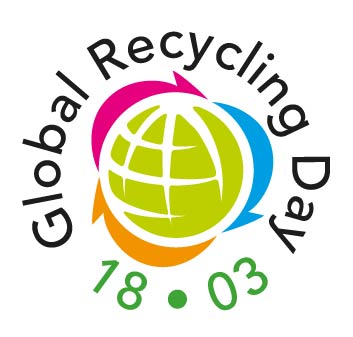Naturally, on Global Recycling Day, it’s the perfect opportunity to drive home the importance of recycling. When done right, recycling helps combat climate change by reducing the need to extract raw resources and it also diverts material away from the landfill, both of which contribute to the reduction of greenhouse gas emissions. Even better, recycling has the potential to extend the material / product life quite significantly, contributing to the goal of a circular economy: a cradle-to-cradle process that removes waste from the process or, rather, uses waste as a resource so that everything is reused and/or recycled.
Here are some recyclable material examples:
-
Aluminum can be recycled an unlimited number of times, but takes an average of 80-200 years to break down in a landfill.
-
Batteries have an outer, metal layer that can take 100 years to decompose in a landfill but the heavy metals contained within that layer never decompose. If sent to a landfill, batteries will eventually leach those heavy metals into soil, groundwater, and other waterways.
-
Clothing has faced an increasing discard rate at the height of the “fast fashion” era. Some estimates say that nearly 80% of textiles make it to the landfill, where they may break down in a matter of weeks or 200 years depending on how and what the fabric is composed of (natural or synthetic). In fact, some synthetic fibers never fully break down, such as the ones containing products like petroleum. Instead of sending clothing to the landfill, consider one of the many ways to reuse, donate, or recycle the item(s).
-
Electronics can be broken down and the various components can be recycled multiple times. However, if an electronic item ends up in a landfill it can take hundreds of years to break down and toxic chemicals are leached into the environment during that process.
-
Food waste occupies a lot of space in landfills and it can take anywhere from one month to over a year to decompose! Worse yet, it releases Methane Gas - a nasty greenhouse gas that is 25 times more powerful than CO2 - into the atmosphere while it breaks down in a landfill. Instead of chucking your wasted food into the trash, toss it in a compost bucket to be picked up, or compost it on your own and add the final product to your garden as a soil amendment.
-
Glass, just like aluminum, can be recycled infinitely but it also takes an infinite amount of time to decompose. Some sources put it at a million years, and others say it doesn’t decompose at all.
-
Lamps contain materials that can be recycled into new products and some lamps, such as fluorescent, must be recycled because they contain mercury which is a toxic chemical. Opening in the mid 90’s, EverLights was the first lamp recycler in Chicago and helped push legislation to make lamp recycling mandatory in Illinois starting in 1997.
-
Paper can be recycled 5-7 times, but it takes four to six weeks to break down in a landfill, sometimes even longer depending on moisture levels and temperature. Moreover, it takes up space in the landfill when it is one of the easiest and most high-demand commodities to recycle.
-
Plastic can be recycled 2-3 times, but never fully decomposes - it just breaks down into smaller and smaller pieces, also called microplastics. Even more devastating, wildlife frequently mistake microplastics as food. While recycling plastic is important, it’s even more impactful when you can reduce the amount of plastic in your life altogether.
The positive change that recycling can create is clear: it’s one of the keys to a circular economy and although it’s not an all-encompassing solution, it’s a start and everyone can start today. Today - Global Recycling Day - is the perfect time to make a commitment to recycling and more sustainable habits, despite any obstacles you may encounter along the way. Add your name to the recycling pledge here.





